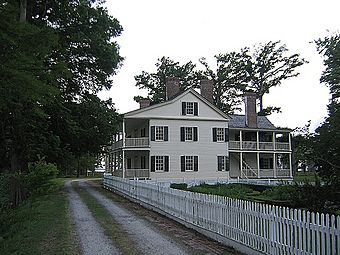Somerset Place facts for kids
Quick facts for kids |
|
|
Somerset Place State Historic Site
|
|

Somerset Place
|
|
| Location | Pettigrew State Park, near Creswell, North Carolina |
|---|---|
| Area | 7 acres (2.8 ha) |
| Built | 1830 |
| Architectural style | "double-pile" plan |
| NRHP reference No. | 70000481 |
| Added to NRHP | February 26, 1970 |
Somerset Place is a historic site in North Carolina. It was once a very large plantation located near Creswell. This important place sits along the northern shore of Lake Phelps. Today, it is a State Historic Site managed by the North Carolina Department of Natural and Cultural Resources.
Somerset Place operated as a plantation from 1785 until 1865. During this time, it grew to be one of the biggest plantations in the southern United States. Many people, including enslaved African Americans, lived and worked here.
Contents
History of Somerset Place
Becoming a Historic Site
In 1969, Somerset Place was recognized as a State Historic Site. This means it is a special place preserved for its history. It helps people learn about the past.
Somerset Homecoming
In 1986, something very special happened at Somerset Place. Descendants of the African American people who were once enslaved there gathered for an event. This gathering was called the Somerset Homecoming. It was a powerful moment for families to reconnect with their history.
The event also inspired a book. It was titled "Somerset Homecoming." The book was written by Dorothy Spruill Redford. She was the manager of the property for many years. She retired in 2008.
What You Can See at Somerset Place
Visitors to Somerset Place can explore many historic buildings. These buildings show what life was like in the 1830s. It's like stepping back in time!
Main Buildings to Tour
You can tour the main plantation house. This was where the plantation owner's family lived. Other buildings include the dairy, where milk products were made. There is also a kitchen and laundry building. A kitchen rations building stored food supplies. You can also see the smokehouse and a salting house. These were used to preserve food.
Enslaved People's Homes
The site also features reconstructed buildings. These show where the enslaved people lived. You can see two homes and a plantation hospital. These buildings help visitors understand the daily lives of the enslaved community. The grounds also include reconstructed tools that were used for discipline in the past.
Visitor Center and Trails
The visitor center has interesting exhibits. They explain the history of Somerset Place. You can also learn about North Carolina before the American Civil War. There is a gift shop where you can find souvenirs.
Nature trails connect Somerset Place to Pettigrew State Park. This park is right next to the historic site. You can enjoy the outdoors and learn about nature there.
Land and Resources
Somerset Place was a huge property. It included more than 2,000 acres of farmland. This land was used to grow crops. The plantation also had 125,000 acres of forests. These forests were full of cypress and white cedar trees.
 | Jackie Robinson |
 | Jack Johnson |
 | Althea Gibson |
 | Arthur Ashe |
 | Muhammad Ali |



